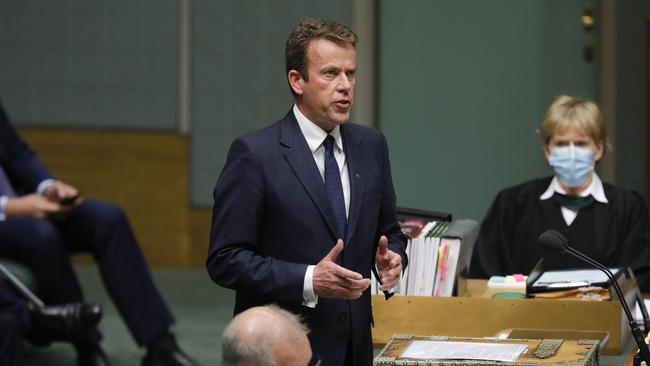Education Minister Dan Tehan gives $30m boost to applied research
Education Minister Dan Tehan has boosted industry-linked research at the expense of other research spending.

Federal Education Minister Dan Tehan has boosted the government’s spending on research projects linked with industry, with a $30m annual increase to the Australian Research Council’s Linkage program.
Mr Tehan said the government was changing the funding settings to direct more money to research collaborations between universities and businesses which would drive innovation and support the post-COVID economic recovery.
“Our government is increasing support for applied research in recognition of the present need to generate strong return on our research investment, and to enable businesses to increase their productivity through innovation,” Mr Tehan said.
The $30m boost to the Linkage program will be transferred from elsewhere in the ARC’s $800m budget.
READ MORE: Block teaching: Victoria Uni’s secret sauce | Block teaching takes off | The vice-chancellor who rejects pay rises | HECS net catches overseas debts | Heavy job losses at two more unis |
However the research intensive Group of Eight universities, which receive most of the ARC’s grant money, warned that the change would reduce Australia’s commitment to fundamental research.
“Shifting buckets of money might produce some short-term results but at what expense to the future of our basic research,” said Go8 chief executive Vicki Thomson.
“The real challenge is the long-term funding of research in this country whereby we drive industry and university collaboration while at the same time we continue to recognise the importance of basic research.”
However the Australian Technology Network of Universities, which represents technology universities, said the increased focus on industry-engaged research funding was a recognition of the vital role universities and businesses will plan in the COVID recovery.
“Our research partners, like many other businesses, have taken a hit this year, but ATN universities realised the importance of supporting them through this crisis so that we can build community and business recovery,” said ATN executive director Luke Sheehy.
However Mr Sheehy said that new funding for industry-engaged research would have been preferable to “a splicing of the current envelope”.
“Discovery research is the critical foundation for our universities to undertake industry-funded, applied research,” he said.
Ms Thomson said that basic, or discovery, research was most beneficial to the country when it was translated into technologies with economic applications.
She called for a major investment fund, modelled on the $20bn Medical Research Future Fund, to support the translation of basic research.
“If we build on that successful model, we can commit to further develop essential translation capability in areas such as engineering, plant biology and materials science to maximise economic and societal benefits of excellent research in national priorities such as defence, agriculture and advanced manufacturing.” Ms Thomson said.




To join the conversation, please log in. Don't have an account? Register
Join the conversation, you are commenting as Logout